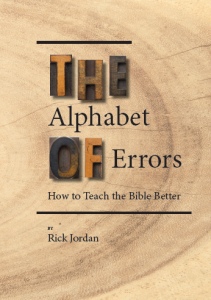Something’s wrong
Bible study for adults gets a lot of knocks. Here are some I’ve heard recently:
It’s boring.
It’s irrelevant.
It’s a clique.
I can’t say that those criticisms are unjustified. Some teachers find ways to make “The joy of the Lord is my strength” bland. Some teachers take us so deep into the weeds that we lose sight of the text’s beautiful meadow. Some small groups find ways to remain small and closed. Some teachers do little preparation. Some teachers do not invite students’ reflection – thus, what happens is a rehashing of what everyone knows or the domination of one point of view or the condemnation of God’s justice work in the modern world.

I created Great Bible Teachers, in part, to combat those criticisms. I’ve learned not to contradict the criticizer. If this is a perspective they have gained by experience, that perception is their reality. I’m not going to change their reality by trying to talk them out of it. They reject the discipline of communal Bible study for some reason. Instead, I ask for their experience. What made it boring? What made it feel cliquish? What ignorance was promoted?
Until recently, that’s all I did. I’ve begun to push back a little.
Challenging a professional writer
A few years ago, I attended a writer’s workshop where I took the opportunity to meet one-on-one with Robert Benson, the author of over 20 Christian books. I had set up this one-on-one a few weeks before the event and told him I’d like to share what I am doing in Bible study curriculum writing and see if he had insights that might help me. When we met, I reminded him of the topic I wanted to discuss.
He said, “I can think of no subject that I am less interested in talking about. Bible study groups are pools of ignorance.” That surprised me. Why was he willing to give me a half-hour to talk about something he was not interested in? I said, “That’s why I’ve started this ministry. To promote good fellowship, solid instruction, and deeper faith.” “Huh, good luck with that.”
More hostility
I heard a church historian proclaim, “Sunday School is dead. May it never live again.” I heard the head of a denominational agency say, “Bible studies are pools of ignorance.” (Yes, I know that’s what Robert Benson said. Apparently, this is a beloved phrase passed around among Bible study critics who scoff at lay leadership.) I heard a divinity school professor say, “The pulpit is first string, the Wednesday night is for second strings who hope to become first string, and Bible study is left for the third strings.”

I have heard many pastors (not mine, thankfully!) complain about Bible studies or small groups in their churches. Their complaints often seemed based around these subjects: Some people go to the Bible study, but they don’t come to worship to listen to them. Some Bible teachers teach things that the pastor does not agree with. Some classes go rogue and study materials the pastor does not want them to read and discuss. Some teachers have a stronger following than the pastor’s following. In other words, their criticisms often are about their own insecurities.
Not all small groups are bad
“You’ve had bad experiences in small groups?” I asked Robert Benson. He replied, “Not all small groups. I have been a part of a small group for several years. We listen to a scripture, pray in silence, and dismiss with a blessing. That’s what I need.”
Frankly, I’d love to have that kind of weekly experience, too. I’ve got Quaker blood. Resting with a text is not for everyone, however.
I asked him, “Isn’t there a time for ‘instruction in righteousness’?”
“Here is how I do that,” Benson said. “You see, I not only have a problem with Bible studies, I have a problem with the scriptures we use for worship. We don’t have enough Jesus. I need to be reminded about the words of Jesus every week. He’s my Teacher, so I need to hear from him. But with the lectionary readings or the random selection by the pastor of that week’s text, I can go weeks never hearing from the mouth of Jesus. So, I began copying down every word of Jesus in a little composition notebook. I just wrote the words of Jesus and began reading them every day. I need to hear, ‘Love your enemies’ more than once a year. I need to hear it often if I am going to remember to do it. One day over lunch, I mentioned that to my publisher. ‘That’s another book!’ he said. I disagreed. No, this was just for me. Still, he wanted to see what I had done. I showed him. It eventually did grow into another book, but it started from my hunger to hear from Jesus. My instruction in righteousness needs to come from him.”
Deeper problems
Criticisms may be valid. Young Life has a saying, “It’s a sin to bore a kid with the Bible.” That’s legitimate. Often, though, the criticisms about lay-led Bible studies are not about lay-led Bible studies. They reflect the critic’s unfulfilled spiritual needs, personal insecurities, or perceived threats to their profession.


I don’t often leave comments but this post got to me. It greatly saddens me that a type of activity that’s been crucial and instrumental in my spiritual growth can be so casually and disdainfully dismissed by people that I imagine are serious Christians. Maybe I’ve been lucky but the various small groups I’ve been in have been led by caring and committed people who sacrificially gave of their time and talents to provide meaningful insights and lead productive discussions. “As iron sharpens iron, so one person sharpens another.” (Prov 27:17) As I see it, small groups are where that has the best chance of happening.
Thanks for your comment, Jay. Yes, it is disappointing when significant influencers use that influence to criticize something that means so much to so many. I have sat in small groups that were too tight, too white, and too quiet. It is frustrating because I know that groups can be open, inclusive, and lovingly argumentative. There are ways to improve all of those problems without aiming hostile criticism toward this method of building Christian community and spiritual discipleship. I wish more professional ministers would see themselves as equippers and partners with the lay leaders who are involved in Christian education. I am so thankful for those that do. Our pastor has been joining the Zoom-hosted Bible studies since the pandemic as a show of support for the classes and their members. That’s a good model.
Next month I will begin an Old Testament study group with a 2-year commitment. It is being led by two Episcopalians, a retired deacon and a layman who weekly attends both a synagogue and an Episcopal services. (Of course, he must must attend both on Zoom now.)
Jesus was an observant Jew. My hope is that by understanding Jesus’ heritage more fully, I can come to know Jesus better and become a wiser Christian.
Have you begun your study? If so, how is it going?